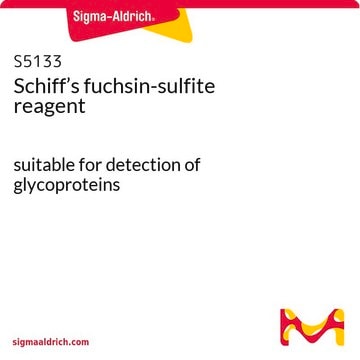375810
Periodic acid
ACS reagent, 99%
About This Item
Produits recommandés
Qualité
ACS reagent
Niveau de qualité
Pureté
99%
99.0-101.0% (ACS specification)
Forme
powder or crystals
Capacité de réaction
reaction type: C-H Activation
Pertinence de la réaction
reagent type: catalyst
reagent type: oxidant
Impuretés
≤0.01% insolubles
≤0.01% other halogens
Résidus de calcination
≤0.01%
Pf
122 °C (lit.)
Solubilité
water: soluble
Traces d'anions
sulfate (SO42-): ≤0.01%
Traces de cations
Fe: ≤0.003%
heavy metals: ≤0.005%
Application(s)
histology
Chaîne SMILES
OI(O)(O)(O)(O)=O
InChI
1S/H5IO6/c2-1(3,4,5,6)7/h(H5,2,3,4,5,6,7)
Clé InChI
TWLXDPFBEPBAQB-UHFFFAOYSA-N
Vous recherchez des produits similaires ? Visite Guide de comparaison des produits
Description générale
Application
- Oxidation of alcohols to ketones and aldehydes.
- Oxidation hydroxylamine derivatives.
- Oxidation of arenes to quinones.
- Deprotection of the dithio- and oxathio-derivatives.
- Oxidative degradation of epoxidized natural rubber (ENR).
- Oxidation of urazoles and bis-urazoles to triazolinediones.
- Oxidative cleavage of glucosazone.
Mention d'avertissement
Danger
Mentions de danger
Conseils de prudence
Classification des risques
Aquatic Acute 1 - Aquatic Chronic 1 - Eye Dam. 1 - Ox. Sol. 1 - Skin Corr. 1B - STOT RE 1 Oral
Organes cibles
Thyroid
Code de la classe de stockage
5.1A - Strongly oxidizing hazardous materials
Classe de danger pour l'eau (WGK)
WGK 3
Point d'éclair (°F)
Not applicable
Point d'éclair (°C)
Not applicable
Certificats d'analyse (COA)
Recherchez un Certificats d'analyse (COA) en saisissant le numéro de lot du produit. Les numéros de lot figurent sur l'étiquette du produit après les mots "Lot" ou "Batch".
Déjà en possession de ce produit ?
Retrouvez la documentation relative aux produits que vous avez récemment achetés dans la Bibliothèque de documents.
Les clients ont également consulté
Notre équipe de scientifiques dispose d'une expérience dans tous les secteurs de la recherche, notamment en sciences de la vie, science des matériaux, synthèse chimique, chromatographie, analyse et dans de nombreux autres domaines..
Contacter notre Service technique











